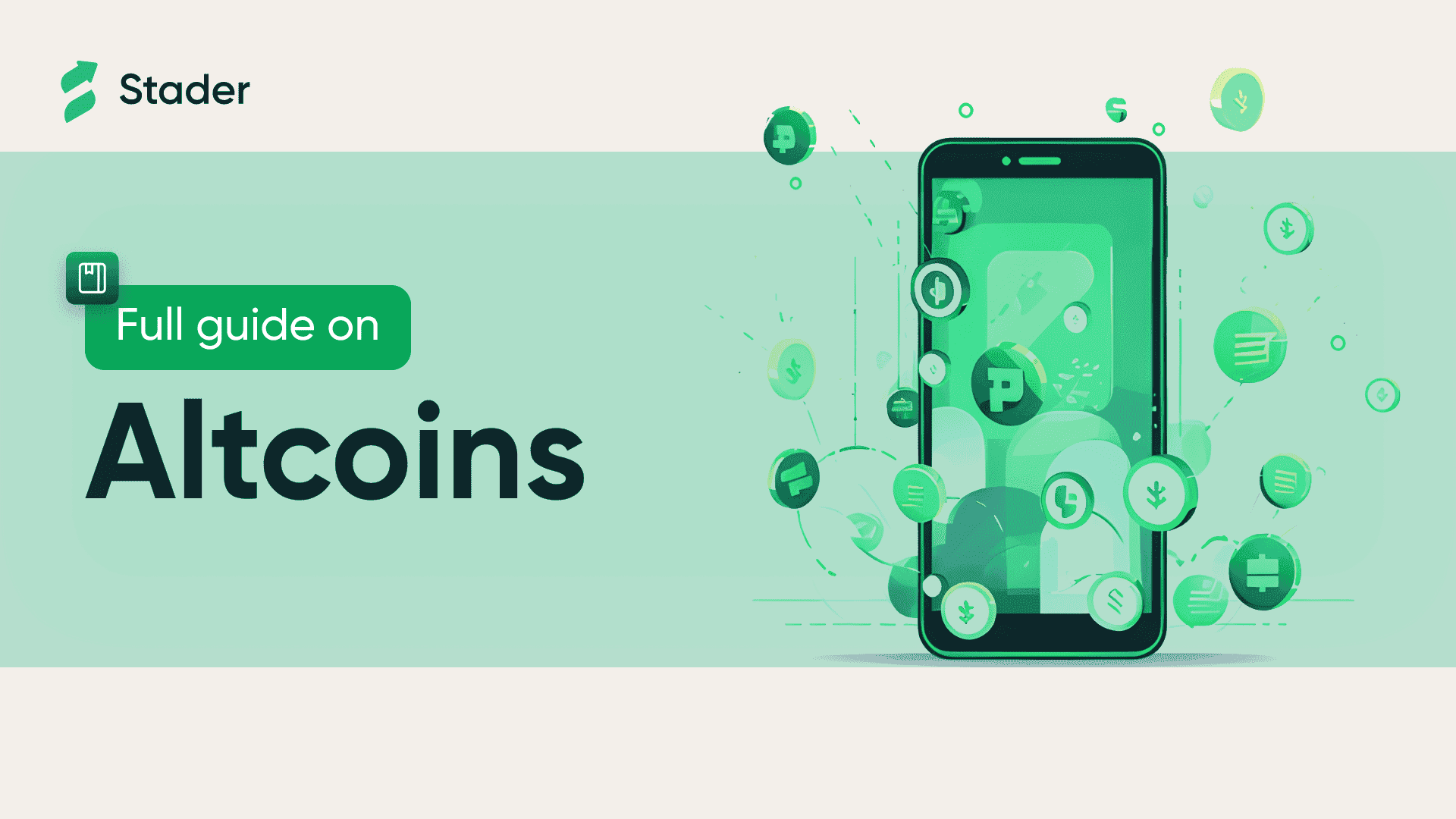What is an Altcoin?
Home
Blogs
Staking Basics
What is an Altc...

What is an Altcoin?
An Altcoin is a cryptocurrency that is not Bitcoin. The term includes the terms “alternative" and "coin". Altcoins were created as alternatives to Bitcoin, with the goal of differentiating themselves from Bitcoin by improving its design or functionality. Some altcoins are designed to be faster, more secure, or more energy-efficient than Bitcoin. Others can offer new features, such as decentralized applications.
Also Read: Smart Contracts
What are the types of Altcoins?
There are many different types of altcoins, each with its own unique features and goals. Some of the most popular types of Altcoins include:
- Payment tokens: These altcoins are designed to be used as a medium of exchange. They are often faster and more efficient than Bitcoin, and could offer lower transaction fees. Some of the popular payment tokens include Litecoin, Dash, and Ripple.
- Stablecoins: Stablecoins are designed to be less volatile than Bitcoin. They are often pegged to a fiat currency, such as the USD, which means that their value is relatively stable. Stablecoins are often used for trading and investment, as they offer a way to hedge against the volatility of Bitcoin and other cryptocurrencies. Some popular stablecoins include Tether, USD Coin, and Binance USD.
- Utility tokens: Utility tokens are the altcoins used to access a particular service or platform. For example, the Binance network uses BNB token as a utility token to pay for gas, which is the fee required to execute transactions on the network. Other examples of utility tokens include MATIC, SOL and FTM.
- Security tokens: Security tokens are the altcoins representing an ownership stake in a company or asset. They are very similar to traditional securities, such as stocks or bonds. Security tokens have the potential to revolutionize the way we invest and raise capital. Some examples of security tokens include Filecoin, Blockstack, and Tezos.
- Governance Tokens: A governance token is a type of cryptocurrency that is used to manage a decentralized autonomous organization (DAO). DAOs are organizations that are run by code and not by people. Governance tokens gives the token holders the ability to vote on decisions that affect the DAO, such as how funds are allocated and what features are added to the platform.
- Memecoin: A memecoin is a type of cryptocurrency that is based on an internet meme or has some other humorous characteristic. Memecoins are often created as a joke, but they can sometimes gain significant value due to community support and speculation. Memecoins are often highly volatile, and their prices can fluctuate wildly. Their value is based solely on speculation. As a result, memecoins are considered to be high-risk tokens.
Also Read: What Is Validator
Advantages of Altcoins
Some of the most noteworthy advantages of Altcoins are:
More features and functionality: Altcoins are often created to address the limitations of Bitcoin. For example, some altcoins have faster transaction speeds, lower fees, or more advanced features such as smart contracts.
More innovative: Altcoins are constantly being developed and improved which means that there is always the potential for new and innovative altcoins to emerge.
More accessible: Altcoins have made cryptocurrency more accessible to newer users, making cryptocurrencies a part of the general public.
Also Read: Ethereum Merge
Disadvantages of Altcoins
Some of the risks to keep in mind while buying Altcoins are:
- More volatile: Altcoins are often more volatile than Bitcoin, which means that their prices can fluctuate wildly.
- Less liquidity: Altcoins are more often less liquid than Bitcoin, which means that it can be difficult to buy and sell them. This can make it difficult to exit a position if the price of an altcoin falls.
- More scams: There are many scams associated with altcoins, so it is important to do your research before getting into any of the altcoins.
- Less established: Altcoins are not as established as Bitcoin, which means that there is less information available about them that makes it difficult to assess the risks and potential rewards of an altcoin.
Also Read: What Is Tokenomics
What is the Future of Altcoins?
The future of altcoins is currently uncertain. Some experts believe that altcoins will eventually replace Bitcoin as the dominant cryptocurrency in the future while others believe that altcoins will continue to play a niche role in the cryptocurrency market.
There are a number of factors that will likely shape the future of altcoins, including:
- Development of new altcoins with innovative features: If new altcoins are developed that offer significant improvements over Bitcoin, then they could displace Bitcoin as the dominant cryptocurrency.
- Regulation of cryptocurrencies: If cryptocurrencies are regulated more heavily, it could make it more difficult for altcoins to compete with Bitcoin.
- Acceptance of cryptocurrencies: If more merchants and businesses accept cryptocurrencies, then this could boost the demand for altcoins.
Ultimately, the future of altcoins will depend on a number of factors. However, it is clear that altcoins are a growing force in the cryptocurrency market, and they are likely to play an increasingly important role in the years to come.
Also Read: Matic Bridges
Frequency Asked Questions (FAQs)
Q) What are the most popular Altcoins?
Ans) Some of the most popular Altcoins are:
- Ethereum (ETH)
- Binance Coin (BNB)
- XRP (XRP)
- Cardano (ADA)
Q) Is It Better to Back Bitcoin or Altcoins?
Ans) Bitcoins are often viewed as a ‘Store Of Value’ token, whereas Altcoins can offer larger profits but with higher risk. Apart from this, Altcoins offers unique functionalities like smart contracts, faster transaction times, and improved security. Therefore it depends on the users based on the kind of asset they want to buy.
By:
Shivendra Singh
Join Stader’s newsletter
Get the latest updates, new DeFi strategies and exclusive offers right in your email box
Analytics
© Copyright 2023 Stader. All rights reserved.











